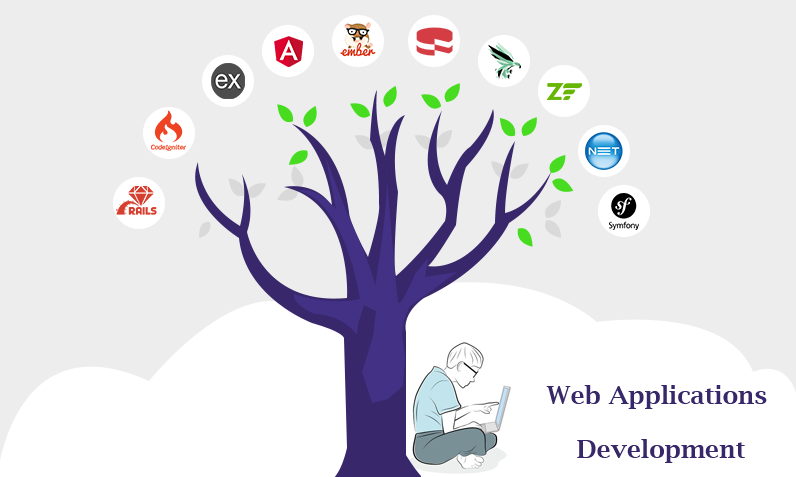Before creating a web application, it is imperative that you identify the framework on which you will develop it. Frameworks serve as platforms of support for building a web application and can complement the features that you’re planning for your web app. If you’re partial to a specific programming language, you might want to pick a framework that works well with that language. Wed are the leading Web Application Development Company in India and we referring some web application frameworks currently popular among developers:
-
Table of Contents
ToggleRuby on Rails
Ruby on Rails is an open-source, server-side web application framework. Rails also happen to be an Model-View-Controller (MVC) framework providing default structures for a database, a web service, and web pages. Its long list of success stories includes Basecamp, GitHub, AirBnB, Twitch, and Sound Cloud. Rails also have an amazingly friendly developer community. Any framework with an active community is a godsend for upcoming developers. You’ll have access to a treasure trove of resources, guides, and case studies. We personally recommend Rails because it’s an open source, one that comes with a large reference library and some great tools to create feature-centric apps.
-
Codeigniter
Codeigniter is a robust PHP framework that is simple to use and also features a great toolkit to create web applications. In addition to being extremely lightweight, this framework comes with excellent documentation that is very easy to understand. It has a good collection of libraries, making it easy to learn, adopt, and deploy. Codeigniter is known to offer flexibility and easy management with the help of an MVC-based framework. Codeigniter allows you to use its own existing scripts alongside your personal core libraries. It is a framework that is free from complex structures and tedious developmental procedures. If you’re a newbie PHP coder, Codeigniter is a good place to start.
Read Also: What Do You Know About Full Stack Development
-
Express.js
Before you get started with Node.JS, we suggest you give Express.js a quick look. Express.js is a prebuilt Node.js framework that allows you to create server-side web applications faster, smarter, and with more flexibility and scalability. You get, firstly, a performance level that matches that of a Node.js framework and, secondly, a robust set of features for web and mobile apps. You can build single-page, multi-page, or hybrid web applications with Express.js. Express is written in JavaScript, making it very easy to program for. Some developers argue that working on Express cuts down their programming time in half. With 5 years of development behind Express, it’s safe to say that this is a mature platform to work with. The error handling can be a little frustrating as you may get lost in the middleware. This framework is recommended for advanced developers.

-
AngularJS
AngularJSmay ring a bell to you if you have been following the development of YouTube and Netflix. It is an open source framework that is maintained by Google and a few other development communities. AngularJS is one of the most popular JavaScript frameworks. This framework allows developers to extend HTML vocabulary for website development. It has a short loading time and is great for test-ability. AngularJS is great for video streaming apps, user-review apps, travel apps, weather apps, e-commerce, and social media apps (LinkedIn uses AngularJS for its mobile app). AngularJS implements the MVC method. As it uses HTML as a declarative language, it’s pretty intuitive. AngularJS is great for rapid front-end development as it doesn’t need any other plugins or frameworks. AngularJS is managed by Google, so there’s a huge community out there for you to learn from.
-
Ember.js
Any description of Ember.js would be incomplete without stating its grand purpose: Ember.js is designed “for creating ambitious web applications”. Take for instance Apple Music; now that’s an ambitious application, an incontestable proof that Ember.js is a serious framework. From single-page web applications to mobile apps and even desktop apps, Ember.js supports it all. Ember.js also focuses on the model and controller aspects of MVC that most other frameworks don’t do justice to. Ember has addressed these issues and slapped on a great UI for amazing client-side functionality. Ember offers a complete development stack and tons of stability. Although most developers tend to pick frameworks such as Angular, Ember’s backward compatibility feature puts it in a unique position as a framework.
Read Also:Web Development & Design Skills, You Need To Develop A Site
-
CakePHP
CakePHP offers a full-stack framework and is considered to be one of the most comprehensive PHP frameworks out there. Its seamless configuration makes it highly popular among developers. CakePHP allows developers to pull any utility classes into their own apps or use custom router classes to create a micro-framework. CakePHP boasts a rich query API and supports all kinds of database drivers or database types for both PDO and native drivers. CakePHP is perfect for budget-friendly web app development and also works with the MVC coding method.
-
Phalcon
Phalcon is an open source PHP framework. It is also one of the fastest PHP frameworks out there. Phalcon was developed with innovative architecture and features some of the lowest overheads for an MVC-based application. Phalcon uses fewer resources and yet gives high performance. It can handle more HTTP requests than other frameworks because it is written in the C language. Phalcon is easily modifiable and can be compiled for customized use.
-
Zend Framework
Zend framework is an open source object-oriented web application framework for PHP 5. Zend framework provides an advanced MVC implementation that can be used to establish a basic structure for Zend framework web applications. Zend also supports multiple database systems and vendors. It has a flexible caching subsystem with support for many types of back-ends. AJAX is also supported via JSON on the Zend framework, thus proving to be advantageous to both the customer and the developer. Zend is a fan favorite amongst veteran developers and continues to be popularly used in the industry.
-
ASP.Net
ASP.net is a web app development platform that is perfect for building desktop and mobile applications. ASP.net uses the HTTP protocol and optimizes HTTP commands. Built on Common Language Runtime (CLR), ASP.net is great for creating large apps with less coding. Writing code for ASP.net is as easy as deploying it. ASP.net is a strong environment where memory leaks and infinite loops can be quickly spotted and neutralized.
Read Also: Benefits Of Custom Software Development For Your Business
-
Symfony
Symfony is a PHP web development framework. Performance testing is a core feature of Symfony-one of the reasons developers choose to work with it. In addition, multiple developers can effortlessly manage a Symfony project. However, Symfony is recommended for veteran developers who know their way around multiple frameworks, because the learning curve can be quite steep.
Last words…
At Dreamsoft4u, we know that remarkable customer support is an absolute must, and that’s why our support team takes client feedback, implementation and training seriously. We pride ourselves on working collaboratively with new clients to quickly set up systems and complete data conversions – minimizing the pain and maximizing the results, and we’re with you every step of the way.
If you’re looking for a Best Web Application Development Company in India, don’t leave things up to luck! Contact Dreamsoft4u today to schedule a free demo and learn why we’re the right choice for the Web Development Services industry.
Contact Us – (+1)-949-340-7490 | Mail at enquiry@localhost











